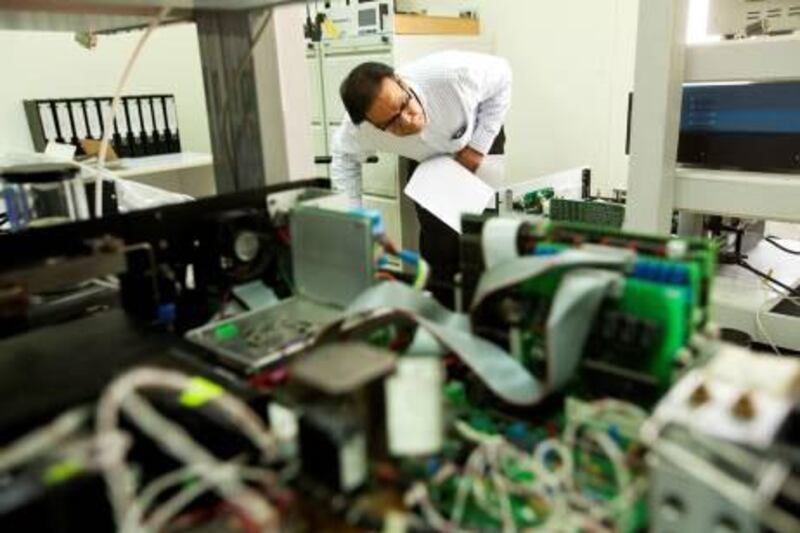ABU DHABI // New research laboratories are tackling the problems of air and sound pollution in some of the emirate’s noisiest, smelliest areas.
The Norwegian Institute of Air Research (Nilu) has set up labs at Abu Dhabi University, and the two are collaborating on research projects across the UAE.
Nilu has been in the emirate since 2006, working with the Environment Agency Abu Dhabi. Since then, it has completed projects for the likes of Abu Dhabi Municipality, looking at indoor air quality.
The institute runs 12 air-quality stations across the emirate for environment agency, four for the municipality, and two at the newly opened Khalifa Port. Nilu also has two of its own at ADU.
It is discussing the possibility of future projects with companies such as Emirates Aluminium and Khalifa Port.
Nilu has also worked with the agency on noise, helping it to identify problem areas such as those around building sites and set standards for how much noise is allowed at various times of day.
“There are different times when there should be different noise levels and standards in place to regulate that,” said Dr Naser Tibi, regional director for Nilu.
There should also be limits on how much noise workers can be exposed to, said Prof Abdel Mohsen Mohamed, dean of research and graduate studies at ADU.
For all of these projects, the priority is public health.
“It’s not just about air pollutants and noise, but more about environmental health and safety, such as toxicology,” said Dr Alena Bartonova, research director at Nilu.
“These are all things we can collaborate with the university on. There could be environmental issues but the people side is more important.”
Most models for air and noise quality are based on western research.
“In order to protect public health, you need local information both about the environment and its effects,” said Dr Bartonova.
“We can use what we know about Europe and see how much of this we can utilise to get to the same level of information here.”
Air quality is a particular concern in industrial areas such as Mussaffah.
“Air pollution is very important for the development of these industrial areas,” said Prof Mohamed.
“You need to see the impact on public health such as how many people are coming down with asthma, going to hospital, then you can moderate and regulate.”
He said the UAE’s naturally dusty air “affects everyone”.
That and high levels of emissions in some areas are a drag on the economy, said Dr Bartonova.
“Health effects can have social effects,” she said.
“To be able to protect the population, you need to be able to know about lots of things.”
“Now we have some consistent data over the years we can go forward, but we don’t know nearly enough yet to do protection management.”
Nilu is hoping to work with the Health Authority Abu Dhabi to build a better picture of how air quality is affecting the emirate’s health.
The lab’s work will feed into the university’s degree courses, which include public health, environmental health and safety and environmental science.
“ADU’s education programme fits very much with what we’re doing, especially the engineering and public-health parts,” said Dr Bartonova.
Nilu’s experts will give lectures at the university and help develop existing courses and new ones.
The labs, which opened in November, will help students to receive hands-on experience.
Last summer, two ADU students became the first to complete work-experience placements there.
The labs should also help ADU develop its strength in research. There are plans for several academics to work with Nilu on research projects.
That should help the university to rise up international league tables.
Last year, it made the QS World Rankings for the first time as one of the 500 best universities in the world.





